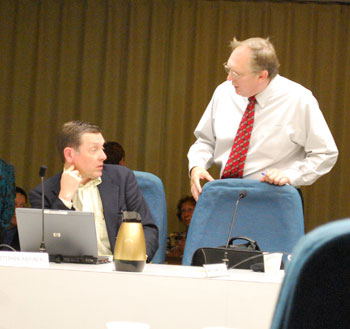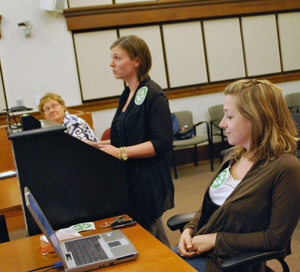Ann Arbor Historic District Commission meeting (Sept. 9, 2010): The last-minute addition of a closed session – which lasted nearly an hour, just prior to deliberations on the Zingerman’s Deli expansion – added a bit of drama to Thursday’s meeting. But ultimately commissioners unanimously approved all projects on their agenda, with only a few concerns cited.
Members of the Ann Arbor Historic District Commission talk with architect Ken Clein, right, in back of the Zingerman's Deli Annex on Sept. 7. Clein is with Quinn Evans Architects, which is handling the proposed expansion project. (Photos by the writer.)
The highest-profile of those projects, of course, was a plan to expand the Zingerman’s Deli operations at the corner of Detroit and Kingsley streets, in the Old Fourth Ward historic district. About a dozen representatives affiliated with Zingerman’s attended the meeting, including co-founder Paul Saginaw and managing partners Grace Singleton and Rick Strutz.
In 2008, commissioners rejected the company’s first attempt to gain HDC approval – in the form of a “certificate of appropriateness,” which included asking permission to tear down a small house on their property that had been gutted by fire. Since that initial rebuff by the HDC, Zingerman’s has been working on an alternative path, gaining approval from the city’s planning commission and city council, and returning to the HDC for a “notice to proceed.”
On Thursday, the commission granted the notice to proceed, which will allow the project to move forward. Several commissioners addressed concerns raised during public commentary about this project setting a precedent, saying that Zingerman’s is a unique business and this expansion is unique as well.
But commissioner Lesa Rozmarek, while noting that she would support the project and that overall Zingerman’s is an asset to the community, also said she wanted it on the record that she felt Zingerman’s had threatened the commission with the prospect of leaving the area if they didn’t get approval. The project sets a bad precedent, she said, adding that “it’s opening a big door that hopefully we can shut after this application.”
Later in the meeting Saginaw responded to Rozmarek’s comments, denying that anyone from Zingerman’s threatened to leave the city – though at one point they did consider moving out of that location to another site within Ann Arbor, he said. Saginaw said he believed the HDC was able to approve the project on its merits.
In other business, the commission issued certificates of appropriateness for three projects: 1) a solar panel installation at 217 S. Seventh St., 2) a request to add an exterior sign near the front door of 209-211 S. State St., where a CVS pharmacy is being constructed, and 3) a proposal for a 1.5-story addition on the back of 442 Second St.
The solar project is being installed on the home of Matt Grocoff, founder of Greenovation TV. Grocoff had attended last month’s HDC meeting, when two other solar panel installations were approved, including one at the historic Michigan Theater building on East Liberty. On Thursday, Grocoff told commissioners that when his solar panels are installed, his home will be the oldest in the nation to achieve net zero energy status, using only energy generated on-site. [Full Story]






